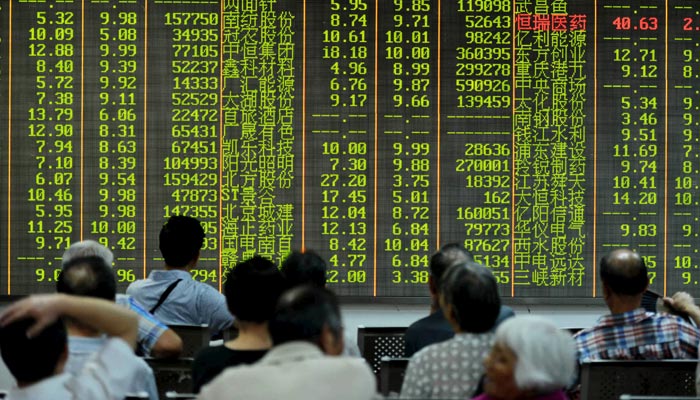Investors look at stock information on an electronic board at a brokerage house in Hangzhou, Zhejiang province, on Tuesday. China stocks slumped more than 7% to their lowest level since December.
AFP/Hong Kong
Asian markets were mixed after a seesaw session on Tuesday, with Tokyo diving and Shanghai extending its worst rout in almost 20 years, while other regional markets bounced into positive territory.
The dollar remained weak and oil prices stayed in the doldrums after finishing on Monday below $40 a barrel for the first time in six years.
Shanghai plummeted 7.63%, or 244.94 points, to 2,964.97, wiping out the year's gains and continuing its steepest four-day rout since 1996.
Tokyo dropped 3.85% to close 733.98 points lower at 17,806.70 - its sixth straight day of falls and the lowest finish since mid-February.
But other regional shares bounced back into positive territory after a bruising session overnight that saw Wall Street fall the most since the height of the financial crisis and European equities slump.
Sydney closed up 2.72% or 136.02 points at 5,137.30, while Seoul rose 0.92%, or 16.82 points, at 1,846.63 and Hong Kong added 0.72%, or 153.39 points, to close at 21,404.96.
"It will take a big policy reaction out of China" to trigger a proper rebound in global shares, Isao Kubo a strategist at Nissay Asset Management, told Bloomberg News.
"It's best to expect high volatility for the forseeable future rather than jump to conclusions about if this is the end or not."
'Running out of room'
Global equities took a battering overnight after an almost 8.50% slump in Shanghai - the heaviest daily loss since 2007 - sparked panic among world investors.
World equity markets have seen some $5tn wiped off their value since China's surprise devaluation of the yuan on August 11 added to fears the world's second largest economy is weaker than thought.
Chinese shares have been on a roller-coaster ride after a year-long debt-fuelled rally collapsed in mid-June, prompting the government to unleash a vast package of measures to support shares.
In the latest such move Beijing said on Sunday the state pension fund will now buy stocks. On Tuesday the central bank injected 150bn yuan ($23.4bn) into the money market to ease tight liquidity.
But dealers said the failure to launch the new monetary easing measures which the market had been hoping for had knocked confidence.
"That shows to investors around the world the Chinese are running out of room in terms of being able to support the market," Ankur Patel, chief investment officer at R-Squared Macro Management, told Bloomberg News.
The dollar remained weak at 119.15 yen, up from 118.51 yen in New York trade on Monday but dramatically weaker than 122.06 yen seen in US trading on Friday.
The euro stood at $1.1550 and 138.10 yen in Tokyo compared with $1.1606 and 137.55 yen in New York overnight.
US benchmark West Texas Intermediate (WTI) for October delivery was trading at $38.97 after closing at $38.24 a barrel on the New York Mercantile Exchange, its first below-$40 close since February 2009.
Brent North Sea crude for October, the international benchmark, was at $43.43 a barrel after closing at $43.04 a barrel in London, its lowest level since March 2009.
Gold traded at 1,150.75 compared to $1,154late Monday.

